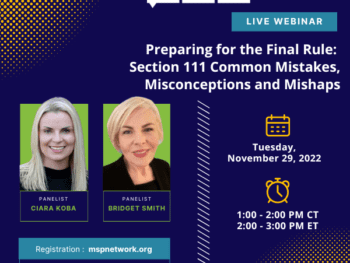Navigating the CMS Workers’ Compensation Medicare Set-aside (WCMSA) review process has become easier with the advent of the WCMSA Reference Guide. This guide was a consolidation of CMS policy memoranda since July 2001 and the Patel Memo. Notwithstanding a more clear process, stakeholders still struggle with the handling of MSAs that do not meet the current review thresholds.
What Are the Current CMS Review Thresholds?
The WCMSA review and approval process is voluntary. According to Section 8.1 of the WCMSA Reference Guide (version 2.3), CMS will only review a proposed Medicare Set-aside when the following workload review thresholds are met:
- The claimant is a Medicare beneficiary and the total settlement amount is greater than $25,000.00; or
- The claimant has a reasonable expectation of Medicare enrollment within 30 months of the settlement date and the anticipated total settlement amount for future medical expenses and disability or lost wages over the life or duration of the settlement agreement is expected to be greater than $250,000.00.
CMS cautions that “Claimants must still consider Medicare’s interests in all WC cases and ensure that Medicare pays secondary to WC in such cases.”
Developing Best Practices In Non-Threshold Cases
The beauty of having a case that meets CMS’ review thresholds is that parties can obtain “certainty” in their settlements. This is not present if you have a case where the claimant is 60 years old, not on Medicare and a total settlement amount is $200,000. Seeking a MSP compliance team that understands these issues can benefit your claim management team, clients and the bottom line of any workers’ compensation program.
- Early Issue Identification. A valued service provider will assist clients understand the complexities of the WCMSA process and triggers that can be identified in their initial review of a claim. This will allow a claim management team to get out ahead of a newly received file and set realistic expectations for future settlement.
- Creativity is Key. The only good file is a closed file. Do not let the Medicare Secondary Payer Act be a barrier to closing down a claim. A valued Medicare service provider should be a partner with any claim management team. In this relationship, the vendor will help the individual claim handlers come up with solutions to close-out troublesome files. This is especially true in instances where the claimant is approaching Medicare entitlement, but a review threshold does not allow for use of the WCMSA review process.
- Communicate; Communicate; Communicate. Increasing file loads are placing burdens on claim management teams and the people who handle insurance claims. It is important to work with a partner that is able to communicate with their clients in an effective and efficient manner. This is essential when it comes to Medicare Secondary Payer compliance.
- Set Realistic Expectations. There is an ever-present tension between CMS policy and the Medicare Secondary Payer Act when it comes to the concept of “future medicals.” When allocating for future medicals, CMS often ignores legal defenses such as causation and views every claim in a vacuum. A valued partner who handles Medicare-compliance matters will be able to suggest strategies that resolve common problems such as treatment that never ceases or out-of-control prescription drug use.
Conclusions
Claim handlers and attorneys should evaluate their cases at the time it is opened for Medicare compliance issues. This should include a firm understanding regarding the age of the claimant, the nature of their injuries, co-morbid conditions, anticipated future medicals and possible settlement outcomes. In addition to these steps, seeking the right Medicare service provider can benefit any claim management team.
Author Michael B. Stack, Principal, COMPClub, Amaxx Work Comp Solutions. He is an expert in employer communication systems and helps employers reduce their workers comp costs by 20% to 50%. He resides in the Boston area and works as a Qualified Loss Management Program provider working with high experience modification factor companies in the Massachusetts State Risk Pool. He is co-author of the #1 selling book on cost containment, Your Ultimate Guide To Mastering Workers Comp Costs www.reduceyourworkerscomp.com, and Founder of the interactive Workers’ Comp Training platform COMPClub. Contact: mstack@reduceyourworkerscomp.com.
©2015 Amaxx LLC. All rights reserved under International Copyright Law.
SALES TO PAY FOR ACCIDENTS CALCULATOR: http://reduceyourworkerscomp.com/sales-to-pay-for-accidents-calculator/
WC GROUP: http://www.linkedin.com/groups?homeNewMember=&gid=1922050/
Do not use this information without independent verification. All state laws vary. You should consult with your insurance broker, attorney, or qualified professional.
























